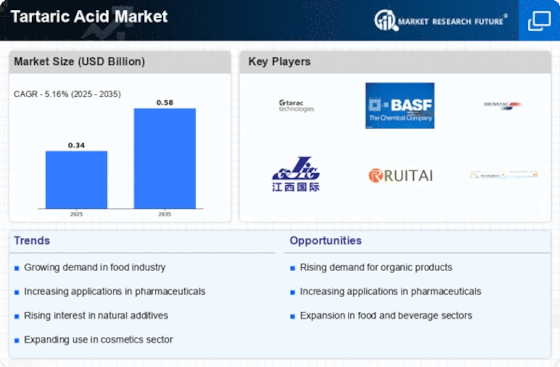Top Industry Leaders in the Tartaric Acid Market

The tartaric acid market represents a dynamic sector driven by diverse applications across industries such as food and beverage, pharmaceuticals, cosmetics, and construction.
Strategies Adopted
Strategies adopted by these key players revolve around product innovation, geographical expansion, strategic partnerships, and mergers and acquisitions. Innovation remains a cornerstone, with a focus on developing high-quality tartaric acid suitable for different industry needs. Geographical expansion strategies involve penetrating emerging markets and strengthening distribution channels. Partnerships and acquisitions are often employed to diversify product offerings or enhance production capacities, thereby consolidating market positions.
Market share analysis
Market share analysis in the tartaric acid industry considers several factors. Product quality, purity, and compliance with industry standards significantly impact market share. Pricing strategies, including competitive pricing and value-added services, play a crucial role in market penetration. Additionally, the ability to cater to various industries' specific needs and the establishment of strong customer relationships contribute to gaining and sustaining market share.
Emerging Companies
In tandem with established players, new and emerging companies are making their mark in the tartaric acid market. These companies often focus on niche applications or specialize in innovative production techniques, such as sustainable sourcing methods or novel extraction processes. They aim to carve a niche by targeting specific industry segments or offering unique, high-quality products that meet evolving market demands.
Industry News
Industry news within the tartaric acid market often revolves around technological advancements, regulatory changes, and market trends. Technological innovations, such as improved extraction methods or sustainable production practices, grab industry attention. Regulatory changes related to food safety standards and environmental regulations significantly impact market dynamics. Moreover, shifts in consumer preferences, including a growing demand for natural and clean-label products, influence the market's trajectory.
Current company investment trends in the tartaric acid market underscore a focus on sustainability, technological advancements, and capacity expansions. Companies are investing in research and development to explore eco-friendly production methods, reduce waste, and optimize production processes. Technological advancements, such as process automation and innovative extraction techniques, attract substantial investments to enhance efficiency and product quality. Furthermore, capacity expansions through facility upgrades or new manufacturing units cater to the increasing demand for tartaric acid across diverse industries.
The overall competitive scenario in the tartaric acid market reflects a balance between established industry leaders, striving to maintain market dominance through innovation and strategic
expansions, and emerging companies seeking to disrupt the market with specialized offerings and novel approaches. The industry's growth trajectory hinges on factors like technological advancements, regulatory landscapes, and evolving consumer preferences. Adapting to these changes and leveraging them to drive innovation and sustainability will be pivotal for companies aiming to thrive in this competitive landscape.
As the tartaric acid market continues to evolve, companies must remain agile, responsive to market dynamics, and proactive in embracing advancements to retain their competitive edge and sustain growth in this dynamic and evolving industry.
Recent News :
Global Key Companies Dominate The Market With Their Extensive Product Portfolios, Global Presence, And Established Distribution Networks, Supplying Tartaric Acid For Various Applications.
The key players of Savory Yogurt Foods Market are
- Blue Hill Inc. (U.S.)
- Skyr Corporation (U.S.)
- Noosa (U.S.)
- Wallaby Yogurt Company (U.S.)
- Chobani LLC (U.S)
- The Icelandic Milk
- Fage International S.A. (Luxembourg)











